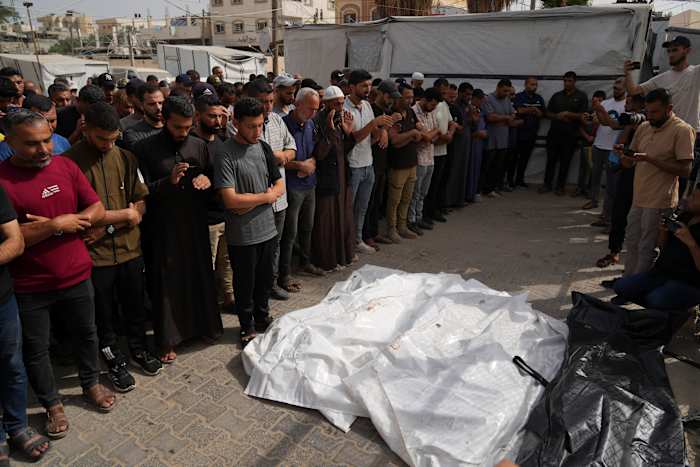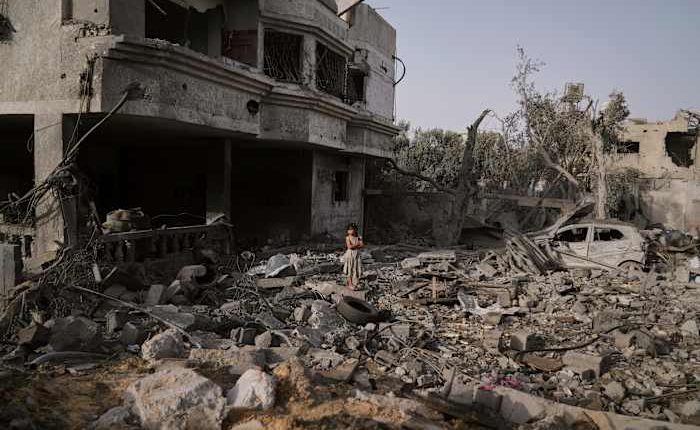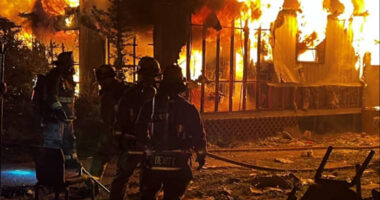Share this @internewscast.com

CAIRO – On Wednesday, Hamas indicated a willingness to consider a ceasefire with Israel. However, they did not fully accept the U.S.-endorsed proposal announced earlier by President Donald Trump. Hamas maintained that any agreement must lead to the cessation of the conflict in Gaza.
President Trump announced on Tuesday that Israel had consented to a 60-day ceasefire deal in Gaza and urged Hamas to agree before the situation deteriorates. He has been applying pressure on both the Israeli government and Hamas to negotiate a ceasefire and hostage agreement, aiming to conclude the ongoing war.
Trump outlined that the 60 days could serve as a period to work on ending the war — a resolution that Israel insists will not happen until Hamas is defeated. He suggested that an agreement might be reached as early as next week.
But Hamas’ response, which emphasized its demand that the war end, raised questions about whether the latest offer could materialize into an actual pause in fighting.
Hamas official Taher al-Nunu said the militant group was “ready and serious regarding reaching an agreement.”
He said Hamas was “ready to accept any initiative that clearly leads to the complete end to the war.”
A Hamas delegation is expected to meet with Egyptian and Qatari mediators in Cairo on Wednesday to discuss the proposal, according to an Egyptian official. The official spoke on condition of anonymity because he wasn’t authorized to discuss the talks with the media.
Israel and Hamas disagree about how the war should end
Throughout the nearly 21-month-long war, ceasefire talks between Israel and Hamas have repeatedly faltered over whether the war should end as part of any deal.
Hamas has said it is willing to free the remaining 50 hostages, less then half of whom are said to be alive, in exchange for a complete Israeli withdrawal from Gaza and an end to the war.
Israel says it will only agree to end the war if Hamas surrenders, disarms and exiles itself, something the group refuses to do.
An Israeli official said the latest proposal calls for a 60-day deal that would include a partial Israeli withdrawal from Gaza and a surge in humanitarian aid to the territory. The mediators and the U.S. would provide assurances about talks on an end to the war, but Israel is not committing to that as part of the latest proposal, the official said.
The official spoke on condition of anonymity because they were not authorized to discuss the details of the proposed deal with the media.
It was not clear how many hostages would be freed as part of the agreement, but previous proposals have called for the release of about 10.
Israel has yet to publicly comment on Trump’s announcement. On Monday, Trump is set to host Israeli Prime Minister Benjamin Netanyahu for talks at the White House, days after Ron Dermer, a senior Netanyahu adviser, held discussions with top U.S. officials about Gaza, Iran and other matters.
Trump issues another warning
On Tuesday, Trump wrote on social media that Israel had “agreed to the necessary conditions to finalize the 60 Day CEASEFIRE, during which time we will work with all parties to end the War.”
“I hope, for the good of the Middle East, that Hamas takes this Deal, because it will not get better — IT WILL ONLY GET WORSE,” he said.
Trump’s warning may find a skeptical audience with Hamas. Even before the expiration of the war’s longest ceasefire in March, Trump has repeatedly issued dramatic ultimatums to pressure Hamas to agree to longer pauses in the fighting that would see the release of more hostages and a return of more aid to Gaza’s civilian populace.
Still, Trump views the current moment as a potential turning point in the brutal conflict that has left more than 56,000 dead in the Palestinian territory. The Gaza Health Ministry does not differentiate between civilians and combatants in its death count, but says that more than half of the dead are women and children.
The war began on Oct. 7, 2023, when Hamas-led militants attacked southern Israel, killing 1,200 people and taking roughly 250 hostages.
The war has left the coastal Palestinian territory in ruins, with much of the urban landscape flattened in the fighting. More than 90% of Gaza’s 2.3 million population has been displaced, often multiple times. And the war has sparked a humanitarian crisis in Gaza, pushing hundreds of thousands of people toward hunger.
___
Mroue reported from Beirut. Associated Press writer Josef Federman contributed from Jerusalem.
___
Follow the AP’s war coverage at https://apnews.com/hub/israel-hamas-war.
Copyright 2025 The Associated Press. All rights reserved. This material may not be published, broadcast, rewritten or redistributed without permission.















